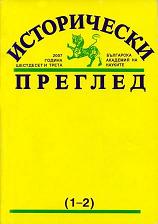Ликвидиране на монархията в България чрез референдум
The Abolition of Monarchy in Bulgaria by Referendum
Author(s): Rumyana BogdanovaSubject(s): Anthropology
Published by: Институт за исторически изследвания - Българска академия на науките
Summary/Abstract: A Council of Regency, appointed by the first Fatherland Government, existed as an institution in Bulgaria from September 9, 1944, to September 15, 1946. The “People’s Regency” fulfilled the functions of Head of State on behalf of Simeon II, but the Palace did not exist as a real political factor. The Council of Regency formally approved the laws and ordinances on the basis of the Turnovo Constitution which had not been officially revoked. The agony of the monarchy in Bulgaria went on for two years. Reduced to a fiction, it was preserved until 1946 when “the clearing of the way towards socialism”, started on September 9, 1944, entered a new more decisive stage. All the major political campaigns were invariably co-ordinated with Moscow and the domestic political considerations were not always determinant. In September 1944 the Bulgarian Workers’ Party (communists) waited for directives from the Kremlin about the period of existence of the monarchy and declared its willingness to fulfil them implicitly. A catalyst for speeding up the movement towards imposing the Soviet model in the countries that had fallen within the range of the “liberating mission” of the Red Army became the international situation. One of the major political reforms for changing the form of state rule from a constitutional monarchy to a republic was carried out as part of the decisive political advance launched in 1946 when the symptoms of the East-West confrontation determined the new course in Eastern Europe. Officially the institute of monarchy in Bulgaria was abolished by direct vote of the broad masses of the people but its fate was decided under the influence of other factors. The results of the referendum held on September 8, 1946 could hardly be regarded as a real indicator of the republican moods of the voters without taking into account the home and international conditions in which the referendum was held, the political climate and the escalation of the political tension in the country in the summer of 1946.
Journal: Исторически преглед
- Issue Year: 2002
- Issue No: 1-2
- Page Range: 116-136
- Page Count: 21
- Language: Bulgarian
- Content File-PDF

